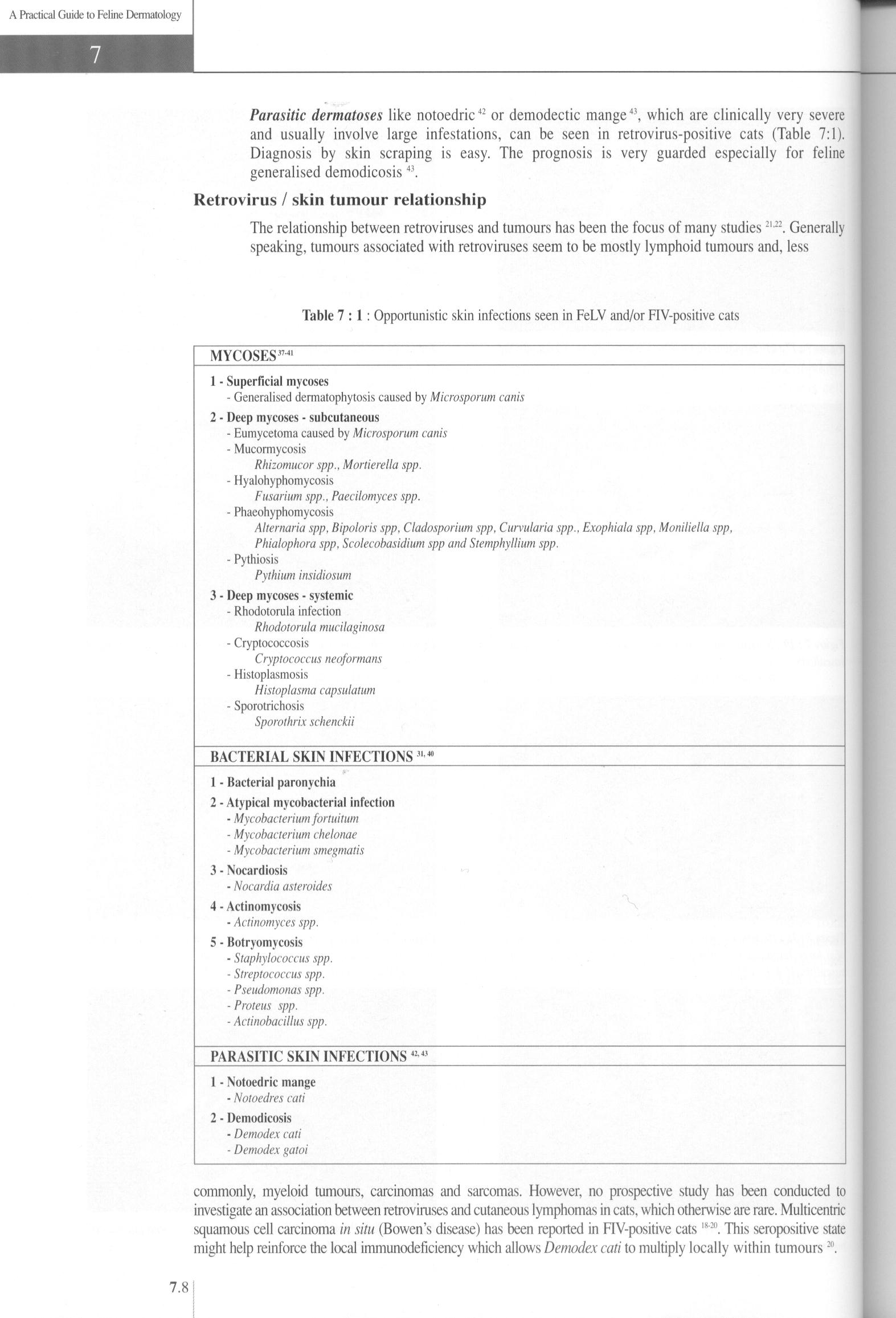78 (130)

Parasitic dermatoses like notoedric42 or demodectic mange43, which are clinically very severe and usually involve large infestations, can be seen in retrovirus-positive cats (Table 7:1). Diagnosis by skin scraping is easy. The prognosis is very guarded especially for feline generalised demodicosis43.
Retrovirus / skin tumour relationship
The relationship between retroviruses and tumours has been the focus of many studies2I'22. Generally speaking, tumours associated with retroviruses seem to be mostly lymphoid tumours and, less
Table 7:1: Opportunistic skin infections seen in FeLV and/or FIV-positive cats
MYCOSES37 41_
1 - Superficial mycoses
- Generalised dermatophytosis caused by Microsporum canis
2 - Deep mycoses - subcutaneous
- Eumycetoma caused by Microsporum canis
- Mucormycosis
Rhizomucor spp., Mortierella spp.
- Hyalohyphomycosis
Fusarium spp., Paecilomyces spp.
- Phaeohyphomycosis
Alternaria spp, Bipoloris spp, Cladosporium spp, Curvularia spp., Exophiala spp, Moniliella spp, Phialophora spp, Scolecobasidium spp and Stemphyllium spp.
- Pythiosis
Pythium insidiosum
3 - Deep mycoses - systemie
- Rhodotorula infection
Rhodotorula mucilaginosa
- Cryptococcosis
Cryptococcus neoformans
- Histoplasmosis
Histoplasma capsulatum
- Sporotrichosis
Sporothrix schenckii
BACTER1AL SKIN INFECTIONS 31411
1 - Bacterial paronychia
2 - Atypical mycobacterial infection
■ Mycobacterium fortuitum
- Mycobacterium chelonae
- Mycobacterium smegmatis
3 - Nocardiosis
- Nocardia asteroides
4 - Actinomycosis
• Actinomyces spp.
5 - Botryomycosis
- Staphylococcus spp.
■ Streptococcus spp.
- Pseudomonas spp.
- Proteus spp.
■ Actinobacillus spp.
PARASITIC SKIN INFECTIONS 42 43
1 ■ Notoedric mange
- Notoedres cati
2 - Demodicosis
- Demodex cati
- Demodex gatoi
commonly, myeloid tumours, carcinomas and sarcomas. However, no prospective study has been conducted to investigate an association between retroviruses and cutaneous lymphomas in cats, which otherwise are rare. Multicentric sąuamous celi carcinoma in situ (Bowen’s disease) has been reported in FIV-positive catsl8'20. This seropositive State might help reinforce the local immunodeficiency which allows Demodex cati to multiply locally within tumours20.
Wyszukiwarka
Podobne podstrony:
4,851,4241 l-PHENYL-LOWER ALKYL-IMIDAZOLE 4- OR 5-C ARBOXAMIDE COMPOUNDS WHICH ARE USEFUL IN TH
UHAM022 HEADACHE OR MIGRAINE, AC UTE OR CHRONIC? * 5 A headache which feels Like a tight band is aro
l26 d Co lor the pieces without dots a dark color (like black or dark blue) to f ind the hidden imag
Dangerous, immortal, and thirsting for blood.Like it or not, “they” are among us. Laurell K.
c) 1. Would yon like some morę ice-cream? A Would you like sparkling or still? 2. Could you pass
responsive Responsive WebsiteResponsive feature: reponsive website will render perfectly on modern d
234 (22) 23 A Practical Guide to Feline Dermatology autumn, point towards parasitic dermatoses7 such
af (7) 50BIG bead necklace Skatowi Easy This necklace is the perfect choico if you like long or mult
00278 ?7712f42afee1422de9fd75efb5451a 280Montgomery & RungerIntroduction Experimental design mo
więcej podobnych podstron